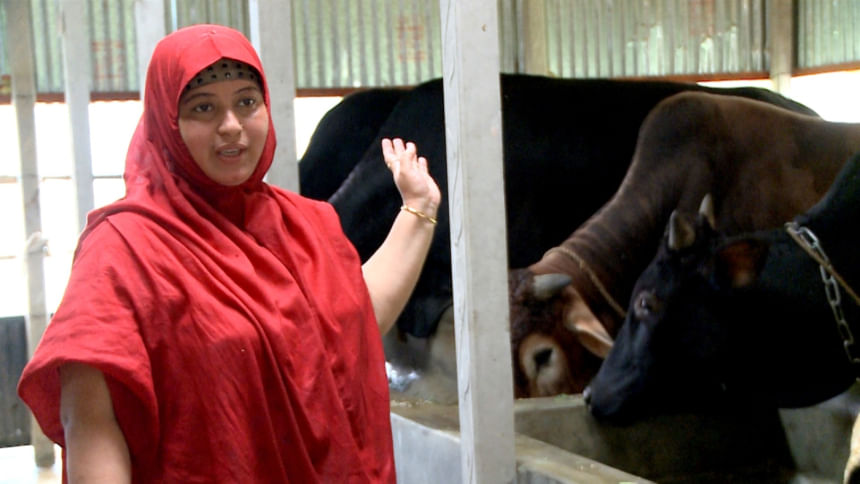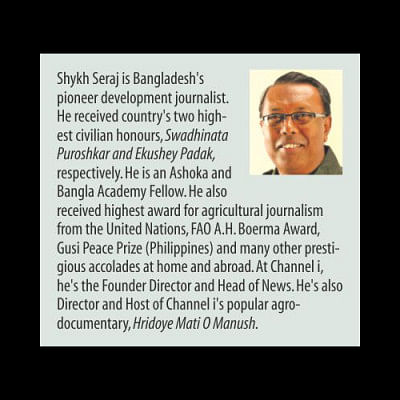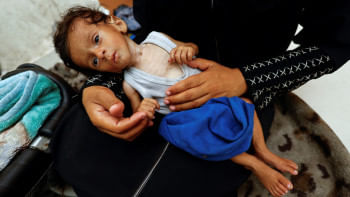Story of a woman agro entrepreneur

A few days back, I went to Faridpur’s Modhukhali upazila’s Salamotpur village. I heard a lot about a highly successful woman entrepreneur. She started from zero. After completing her formal education, she could not find any job for quite a long time. Eventually she got one but deep in her heart, she believed she had to do something which would really make her self-reliant.
Hard work, interest, and dedication made her what she is now today. She has built her own integrated farm named Alif Goat and Dairy, which has brought her much desired self reliance. Many others, especially women, are now following her footsteps. She is Sabina Yeasmin, a farming hero in my eyes.
Sabina rides her scooty from her village to the city to know more about what agricultural goods people need. Over the years, she came to build her own farm. She says how difficult it was at the beginning.
“When my baby was 15 days old, I found it difficult to give her what she required,” she says.
Sabina used to work from 7:00am till 10:30pm, thinking about her baby’s future.
“It was really difficult for me to manage milk for my baby,” Sabina says.
Later on, she completed her master’s education and joined Saudi Embassy. Since then, she started raising goats at the village.
“Then, I felt agriculture is the only way which can change my life,” said Sabina.
She finally started her goat farm in 2013. Sabina tried different ways for a better life. Now, she has a large integrated cattle farm on around 1.60 acres (four bigha) ofland.
“I get plenty of milk from this farm. I give away some for kids,” says Sabina.
Sabina sells around 160 litres of milk at the local market. She also prepares curd and supplies it to Dhaka.
“What’s your profit from milk?” I asked.
“I don’t think much about the profit. I am doing this out of passion,” she replied.
“With the money I earn from selling milk, I raise calves and 200 goats. I also pay my farm staff,” she added.
Friesian, Mundi and Jersey varieties of cows are available at Sabina’s farm. 14 bulls are being raised through organic method.
“I don’t do anything for business, but the passion is bringing me money,” says Sabina.
She is rearing couple of bulls for two years. She believes she can sell those for around 1 crore taka (approximately USD 118,216) after fattening. She has a total of 20 female calves. Sabina believes if they become mothers each will be sold at around 2 lakh taka (approximately USD 2364). She can make at least 40 lakh taka(approx 47,286 USD) from them. Her expenses behind the cows and bulls are not more than 50 lakh taka but she with her right strategy can make more than one crore taka.
At a glance, the farm seems to have different houses for different animals. And in the middle, raw grass is being cultivated in open space.
She has Black Bengal, Jamuna Pari, and Brown Bengal varieties of goats. Even though goats bring plenty of profit, there are high risks, says the entrepreneur. So she believes it is a must to remain careful. First, she bought 34 goats. Within a week, 15 of them died.
“The reason behind might have been my inexperience and wrong management”, as she says.
“Perhaps, when I bought the goats some were not vaccinated,” she doubts.
Sabina learned a lot from this loss and became even more careful in her future farm monitoring.
“I have more than 150 goats now. If I sell 50 in every six months, then I will be able to earn 12 lakh taka(approx USD 14186) yearly,” she says.
“But there will be more. Because, when I will have more breeding, I will have more in quantity,” she strongly believes.
Goat milk is regularly collected and marketed. She has orders for goat milk from Dhaka.
“Goat milk is not conventional; how much is for a kg?” I asked.
“500 taka (approx 5.91 USD),” she replied.
“It’s very costly,” I said.
“Because of the purity and quality of the milk,” she replied.
“People also drink it for medicinal purposes,” she says.
At her farm she also has local chicken, turkey, partridge, goose, pigeon and many other birds. She has started with a few. Because after starting with goats, she faced a crisis. So she is being careful while rearing the birds. She’s observing whether or not they are affected with any diseases, what they are habituated to. Local chicken have less diseases.
Sabina’s husband Hamidur Rahman Chunnu is a true inspiration for her.
“Sabina’s dedication and my support brought her to this position today. We worked together during troubles and in good times,” says her husband.
“Many social obstacles will come in the way of business. But I told her that it doesn’t matter what others think,” says Hamidur Rahman.
Many people are inspired looking at the works of Sabina. Many entrepreneurs come here to buy cows for their farm.
Sabina believes every women should be self-reliant. And, every girl should be educated to make their own way. There is no free bread for anyone and one must work with honesty to achieve the goal, says Sabina.
“Whatever development you’re seeing here, there is no bank loan or financial institution behind this,” says Sabina.
“I have always followed Hridoye Mati O Manush and I have waited 20 years to meet you,” says a beaming Sabina, looking straight at me.

“Your programmes informed and inspired me to be here only in six years,” says Sabina.
She also has fisheries, poultry and interestingly she has started working on her own tiles factory very recently.
“There was a time when I was not able to feed my daughter milk or buy her a nice dress,” she says, recalling her struggling days.
Today Sabina has helped her daughter study at Cambrian School and College in Dhaka. And now after getting good score in IELTS, she has been enrolled at Manitoba University in Canada. She will leave in coming September.
“If I could do it, why not other women?” she puts a question.
Dear readers, women like Sabina Yeasmin are immensely contributing to production and development. Development at all levels -- family, society and nation -- is every citizen’s goal. I do hope, not only in farming sector, but also in the overall economic development of the country, women’s participation will increase even more where we will see Sabina (s) from different sectors.

 For all latest news, follow The Daily Star's Google News channel.
For all latest news, follow The Daily Star's Google News channel. 



Comments